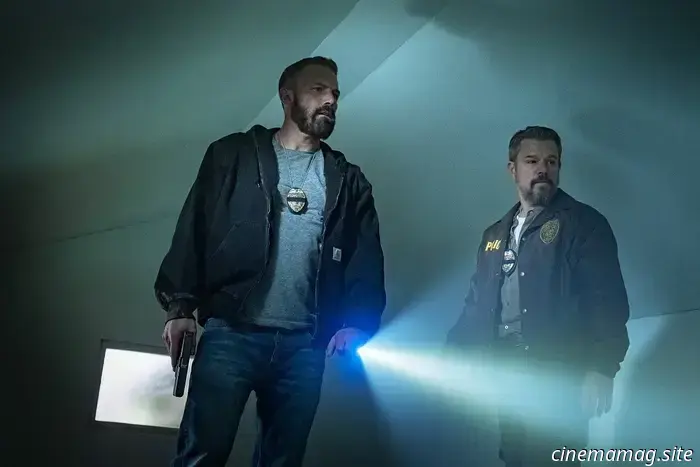-Movie-Review.jpg)
Rental Family (2025) - Film Review
Rental Family, 2025.
Written and Directed by Hikari.
Featuring Brendan Fraser, Takehiro Hira, Mari Yamamoto, Akira Emoto, and Shannon Gorman.
SYNOPSIS:
Fraser portrays an American actor lost in Japan, engaged by a rental family agency to “act” in the lives of strangers. He plays a father connecting with a daughter he’s never met and a companion for a man who simply wishes to play video games—these are the lives he encounters. Yet, within these brief performances, genuine truths emerge. Gradually and poignantly, we come to realize that the only authentic aspects of many of these lives may be the lies they are paying for.
Rental Family includes moments reminiscent of a soap opera—such as a man suddenly appearing to inform a young girl that he is her father, or two strangers pretending to elope so one can reunite with their true love. These instances are not merely segments of the film; they embody its essence. Rental Family explores a world yearning for connection but struggling to find it outside the realm of Capitalism. Fraser, perfectly cast, embodies both sides of this desire, portraying an actor who fills these roles while also purchasing companionship for himself. The film inherently acknowledges its own contradictions, ‘selling emotion,’ as one character states, yet it still feels authentic.
Fraser expressed at a screening I attended that Rental Family reflects the “loneliness epidemic” prevalent in today’s society. The character he inhabits, Phillip, is not just compensated for being a part of others’ lives, but he also seeks out companionship at a cost. Tragically, one of his closest bonds is with his agent, which exists solely over the phone—no handshakes, no eye contact, merely a voice on the other line. The actor who rents himself out also hires someone to fill his own emotional void, and the sole person who knows his true name is unaware of his real face. In a reality where connection is commodified or reduced to a ringtone, Fraser's portrayal poignantly illustrates the painful human cost involved. What does it truly mean to matter in someone’s life, even if just for a fleeting moment? And more chillingly: what occurs if the actor chooses to remain after the performance ends?
In this film, Fraser doesn't just plow through; he glides seamlessly. Towering both physically and emotionally, he represents a gentle giant who seems to bend not just under the low door frames of Tokyo apartments but also under the invisible burdens of others’ needs. Following The Whale, we witness a transformed Brendan Fraser—one less focused on physical comedy and more inclined towards fostering intimacy. If the eyes are indeed windows to the soul, Fraser embodies Shang Tsung from Mortal Kombat—able to channel grief and numerous personas, all within a single character.
He is complemented by Takehiro Hira, from Shōgun, who portrays the stoic yet compassionate owner of the rental family agency. Together, they embody two facets of the same dilemma—one striving to maintain the illusion, the other contemplating the nature of reality. Newcomer Shannon Mahina Gorman skillfully avoids the clichéd pitfalls of child actors, delivering a grounded performance that smartly avoids excess, becoming one of the film’s greatest assets.
Director Hikari wisely chooses to exercise restraint. In less skilled hands, the narrative of a little girl requiring a father figure could easily devolve into overly sentimental manipulation. However, Hikari places trust in her actors’ expressions as much as in their dialogue. She discovers emotional depth not in overt breakdowns or grand speeches, but in the unspoken moments following an actor's departure. She directs like a musician, harmonizing not only with the score but also with production design and editing, recognizing that the silence in between can be the most significant.
The film’s score, by Alex Somers and Jónsi of Sigur Rós, is both ethereal and deeply human. While it may not be the pinnacle of Jónsi's work—the honor still belongs to Matt Shapiro’s 2008: The Cinescape on YouTube—it subtly enhances scenes without overwhelming them, providing the audience with the desired simulated memories. The remixed version of David Byrne’s Glass, Concrete & Stone, effectively featured in the trailer, is also utilized well here.
Much of the film resembles a travelogue: with Fraser ducking under doorways, strolling through parks, and quietly sitting in convenience stores. All of these moments are beautifully shot by Takuro Ishizaka. However, these instances are not mere filler; they constitute the essence of the film.
The screenplay leaves little room for depth—by design. Each scene plays out like a vignette, presenting only fleeting insights into these temporary connections. Yet, within this fragmentation, Hikari discovers something valuable. The third act (which I won’t reveal) offers a predictable but impactful emotional resolution, leveraging the story's constraints as a narrative strength.
Rental Family stands
-Movie-Review.jpg)
-Movie-Review.jpg)
-Movie-Review.jpg)
-Movie-Review.jpg)
-Movie-Review.jpg)
-Movie-Review.jpg)
Other articles
 Weather the storm with Vigor's newest season, Tempest.
Bohemia Interactive has launched Tempest, the newest season of their well-known shooter Vigor. The 24th Season features a revamped battle pass, a new weapon, challenges, and numerous activities for survivors in post-apocalyptic Norway. In this fresh season of the free-to-play looter-shooter, fog is rolling into the Outlands, accompanied by a dangerous storm […]
Weather the storm with Vigor's newest season, Tempest.
Bohemia Interactive has launched Tempest, the newest season of their well-known shooter Vigor. The 24th Season features a revamped battle pass, a new weapon, challenges, and numerous activities for survivors in post-apocalyptic Norway. In this fresh season of the free-to-play looter-shooter, fog is rolling into the Outlands, accompanied by a dangerous storm […]
 The influencer thriller Killer Content has released both a trailer and a poster.
In anticipation of its digital release next week, a trailer and poster have been unveiled online for Chris St. Croix's forthcoming thriller, Killer Content. The movie follows an unstable fan who takes her favorite social media influencer hostage in hopes of attaining her own internet fame, oblivious to the fact that her idol harbors a dark and [...]
The influencer thriller Killer Content has released both a trailer and a poster.
In anticipation of its digital release next week, a trailer and poster have been unveiled online for Chris St. Croix's forthcoming thriller, Killer Content. The movie follows an unstable fan who takes her favorite social media influencer hostage in hopes of attaining her own internet fame, oblivious to the fact that her idol harbors a dark and [...]
.jpg) “I Prefer Films That Are More Subdued in Their Approach”: Sierra Falconer Discusses Sunfish (& Other Stories on Green Lake)
Sunfish (and Other Stories on Green Lake) is the type of film you wish to stumble upon at a festival. This beautiful drama, which marks the feature debut of writer and director Sierra Falconer, is inspired by her own life experiences. Taking place in and around Green Lake in Michigan, it weaves together four narratives that, as I
“I Prefer Films That Are More Subdued in Their Approach”: Sierra Falconer Discusses Sunfish (& Other Stories on Green Lake)
Sunfish (and Other Stories on Green Lake) is the type of film you wish to stumble upon at a festival. This beautiful drama, which marks the feature debut of writer and director Sierra Falconer, is inspired by her own life experiences. Taking place in and around Green Lake in Michigan, it weaves together four narratives that, as I
 Chicken Run: Eggstraction will be available during Steam Next Fest with a limited-time demo.
Outright Games and Aardman have revealed that their forthcoming game, Chicken Run: Eggstraction, will be showcased during Steam Next Fest this fall. From October 13th to 20th, players will have the opportunity to experience a new, limited-time demo on Steam, tackling puzzles and causing some chaos. This comes ahead of the game’s release on [...]
Chicken Run: Eggstraction will be available during Steam Next Fest with a limited-time demo.
Outright Games and Aardman have revealed that their forthcoming game, Chicken Run: Eggstraction, will be showcased during Steam Next Fest this fall. From October 13th to 20th, players will have the opportunity to experience a new, limited-time demo on Steam, tackling puzzles and causing some chaos. This comes ahead of the game’s release on [...]
 Netflix has released the trailer for The Rip, featuring Ben Affleck and Matt Damon.
Netflix has released the inaugural trailer for The Rip, an upcoming action thriller by writer-director Joe Carnahan. The film features the long-time collaborators Ben Affleck and Matt Damon reuniting once more as two Miami police officers whose team starts to unravel, leading them to doubt their trust in each other when they stumble upon 20 million dollars in an abandoned […]
Netflix has released the trailer for The Rip, featuring Ben Affleck and Matt Damon.
Netflix has released the inaugural trailer for The Rip, an upcoming action thriller by writer-director Joe Carnahan. The film features the long-time collaborators Ben Affleck and Matt Damon reuniting once more as two Miami police officers whose team starts to unravel, leading them to doubt their trust in each other when they stumble upon 20 million dollars in an abandoned […]
-Movie-Review.jpg) Swiped (2025) - Film Review
Swiped, 2025. Directed by Rachel Lee Goldenberg. Featuring Lily James, Ben Schnetzer, Myha’la, Jackson White, Dan Stevens, Ian Colletti, Mary Neely, Ana Yi Puig, Aidan Laprete, Pedro Correa, Coral Peña, Pierson Fodé, Hannah Marks, Olivia Rose Keegan, Hunter Sansone, Larken Woodward, Gabe Kessler, Dermot Mulroney, and Clea DuVall. SYNOPSIS: Based on the narrative of Whitney […]
Swiped (2025) - Film Review
Swiped, 2025. Directed by Rachel Lee Goldenberg. Featuring Lily James, Ben Schnetzer, Myha’la, Jackson White, Dan Stevens, Ian Colletti, Mary Neely, Ana Yi Puig, Aidan Laprete, Pedro Correa, Coral Peña, Pierson Fodé, Hannah Marks, Olivia Rose Keegan, Hunter Sansone, Larken Woodward, Gabe Kessler, Dermot Mulroney, and Clea DuVall. SYNOPSIS: Based on the narrative of Whitney […]
Rental Family (2025) - Film Review
Rental Family, 2025. Written and directed by Hikari. Featuring Brendan Fraser, Takehiro Hira, Mari Yamamoto, Akira Emoto, and Shannon Gorman. SYNOPSIS: Fraser portrays an American actor lost in Japan, contracted by a rental family service to “act” in the lives of unfamiliar individuals. A father forming a bond with a daughter he has never met, a secondary participant […]
